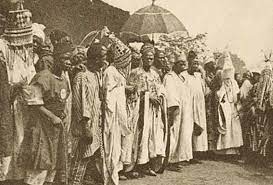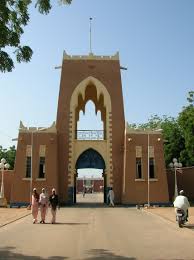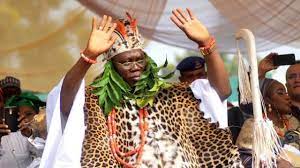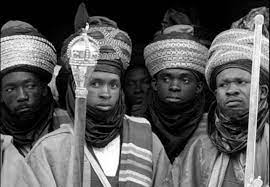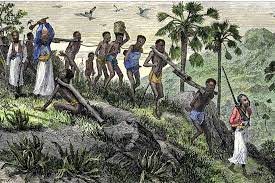
The transatlantic slave trade was an oceanic trade in African men, women, and children which lasted from the mid-sixteenth century until the 1860s.
Slavery did not only affect Nigerians, but it was an Africa-wide thing. While slavery might have ended in a way, it is unfortunate that the aftermath still lingers on. For example, many Nigerians still suffer from what we can call Post Traumatic Slave Syndrome (PTSS). This is because of the untold oppression that came along with slavery.
As a result of this, what can be termed as a survival strategy has quickly become a daily habit among Africans. Even African governments are not left out of the aftermaths of slavery; many of them see their followers as inconsequential individuals that can be oppressed without consequences the same way the salve masters treated the African slaves of yesteryears.
How did slavery start in Nigeria?
Many people think that slavery started from the western part of the world, but this is not so at all; slavery had been here long before now and one can even see the mention of slavery in the Holy Bible. The Arabs, Europeans and Americans can be fingered for slave trade in Nigerian and Africa.
Their activities mostly centered around the coastal regions of Africa. The Trans-Atlantic slave trade did not come up until the Trans-Sahara slave trade and these slave traders saw the exchange of humans for money as a norm.
Slave trade persisted in African for a painfully long 14 centuries. Ten of those centuries involved Trans-Sahara slave trade and it began in the 8th century AD. Muslims in the Arab world came down to Africa to buy slaves because it is forbidden in Islam for Muslims to enslave one another.
To forestall this, many Africans decided to convert to Islam so that they the invading Arabs would not take them as slaves. This is to say that both the Arabs and western world used religion as a tool to take Africans, including Nigerians as slaves.
While the Arabs wanted slaves for domestic needs, the westerners, including Europeans and Americans, wanted slaves for industrial purpose and to work on their farms. This is not to say that the Arabs did not want slaves for industrial purposes too, but they were forced to perish the idea because of the riots that broke out from 869 AD to 883 AD in Baghdad.
Western demand for slavery
The Europeans and their America counterparts needed slaves to work on their cotton and sugar plantations and they needed a lot of slaves so that they can meet up with the rising demands. They would have enslaved Native Americans for the purpose, but the latter is unable to cope with heavy labor and could not withstand European diseases.
Then Bartolome de las Casas, suggested that the search for slaves should be taken to Africa; he made the suggestion in 1517 basing the suggestion on the fact that Africans were stronger and able to withstand European diseases.
Internal collaborators
The Europeans would not have been able to make slaves of Africans if not because there were some gullible Africans ready to sell their own people as slaves. All the Europeans and Americans had to do was to give these slave sellers some gifts, after which the latter would kidnap their own people and sell them off to the Europeans.
Some African traditional rulers were also involved in the slave trade business. The items offered as gifts could be in the form of wine or as cheap as mirrors. The Europeans and Americans were too weak to venture inland. So, they had to depend on the local slave traders to help them source for the slaves.
If you look around, you would see that the same behavior of collaborating against our own people to please foreigners for gains is still with us today in Nigeria and Africa.
The British dominance
Britain was one of the most powerful slave buyers of those days. It was considered as the Master of the Universe then and it dominated the slave trade for up to 3 centuries. John Hawkins was the Briton that modernized the version of slave trade started by the Portuguese. He is said to have transformed it into a respectable business and also responsible for starting the Triangular Trade. The Niger Delta region of Nigeria was referred to as the Slave Coast by the British and this was where the British ships anchored in those days in search of local slaves. They would come with items like alcohol, guns and mirrors, which they would exchange for slaves.
Upon arrival at the European end of the trip, these African slaves would then be sold for items like cotton, sugar and even cash by their European enslavers. The business was profitable because there was a consistent demand for guns and alcohol by the African enslavers.
Those buying the slaves at the European end of the chain were also in constant demand for salves to work their plantations. So, the demand for slave was fueled by the increase in demand for cotton and sugar in Europe.
End of slave trade
Then came William Wilberforce, a young Brit, who was the first person to openly oppose slavery. His anti-slave trade movement became very successful and this completed the British to legislate a law banning slave trade.
After the practice was banned in Britain, it still continued in other countries, like America, Portugal, Spain and France. Slave trade was banned in Britain in 1807. Despite the opposing views in the other countries, the law made in Britain held and these other countries was also forced to stop.
It is interesting to note, however, that some African traditional rulers opposed Britain for banning slave trades, notable among them were the Arochukwu Confederacy, Oba of Benin and Ashante King.
We should also note that the decision of Britain to stop slave trade was not because they had the interest of Africans at heart; it was because they did not need slaves anymore because they had become industrialized as at that time.
However, the story was different in America. The northern part of America agreed to end slave trade, but the southern part had a different opinion. This pushed America into a civil war, under the leadership of Abraham Lincoln.
The northern part of the country won the war and this put an end to slave trade in America. Many of the enslaved Africans remained in America today and are being referred to as Black Americans.


















